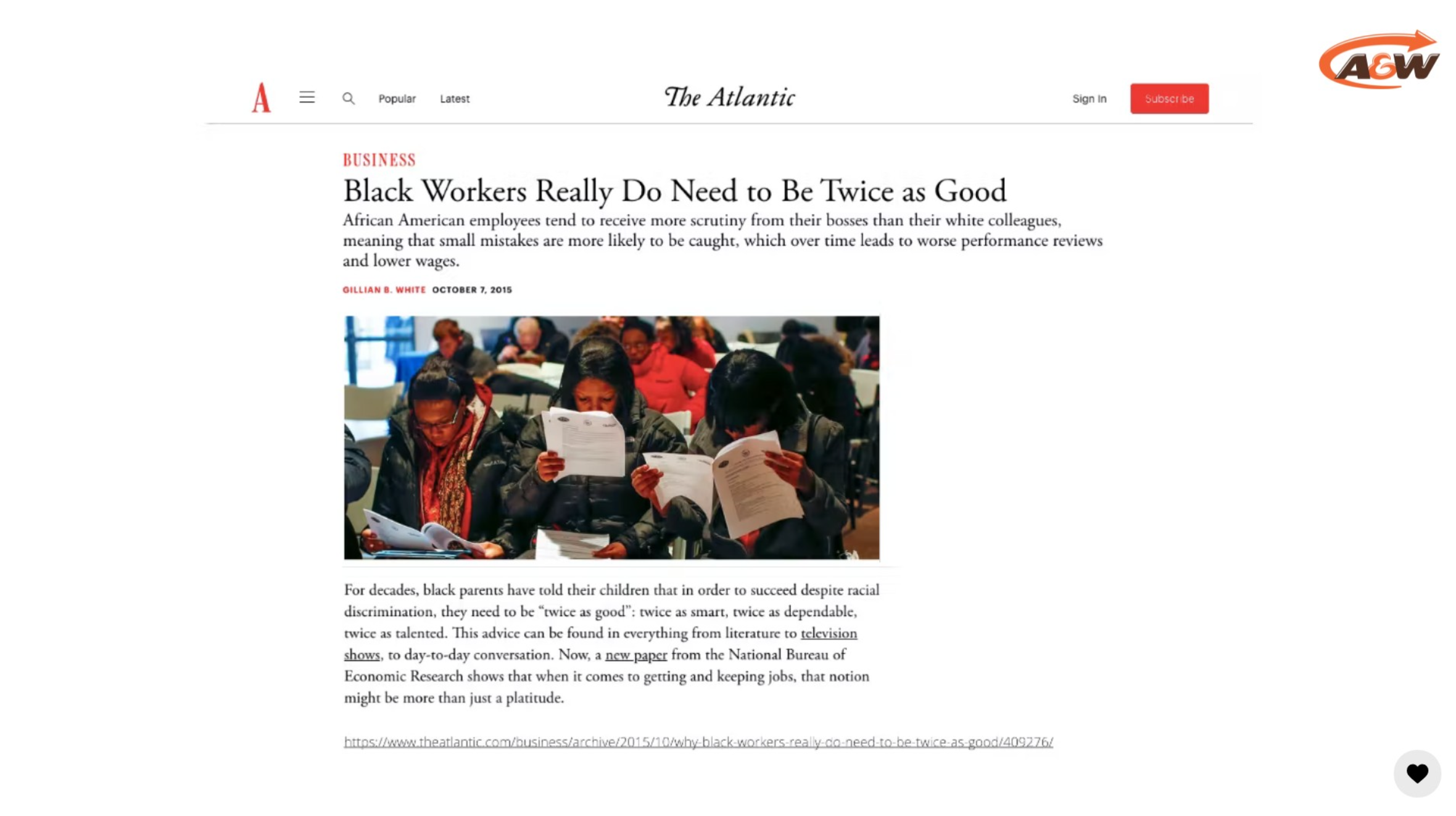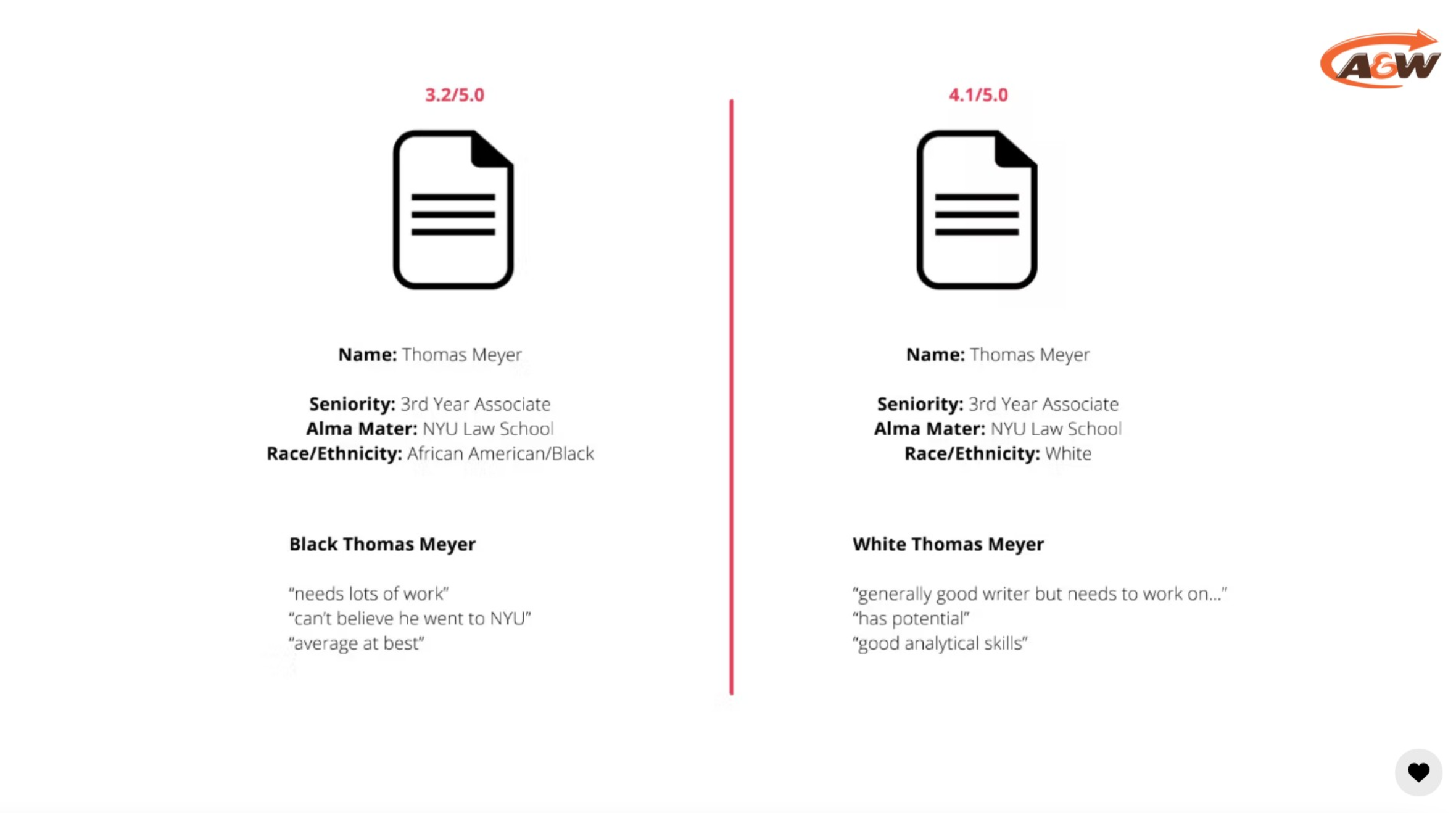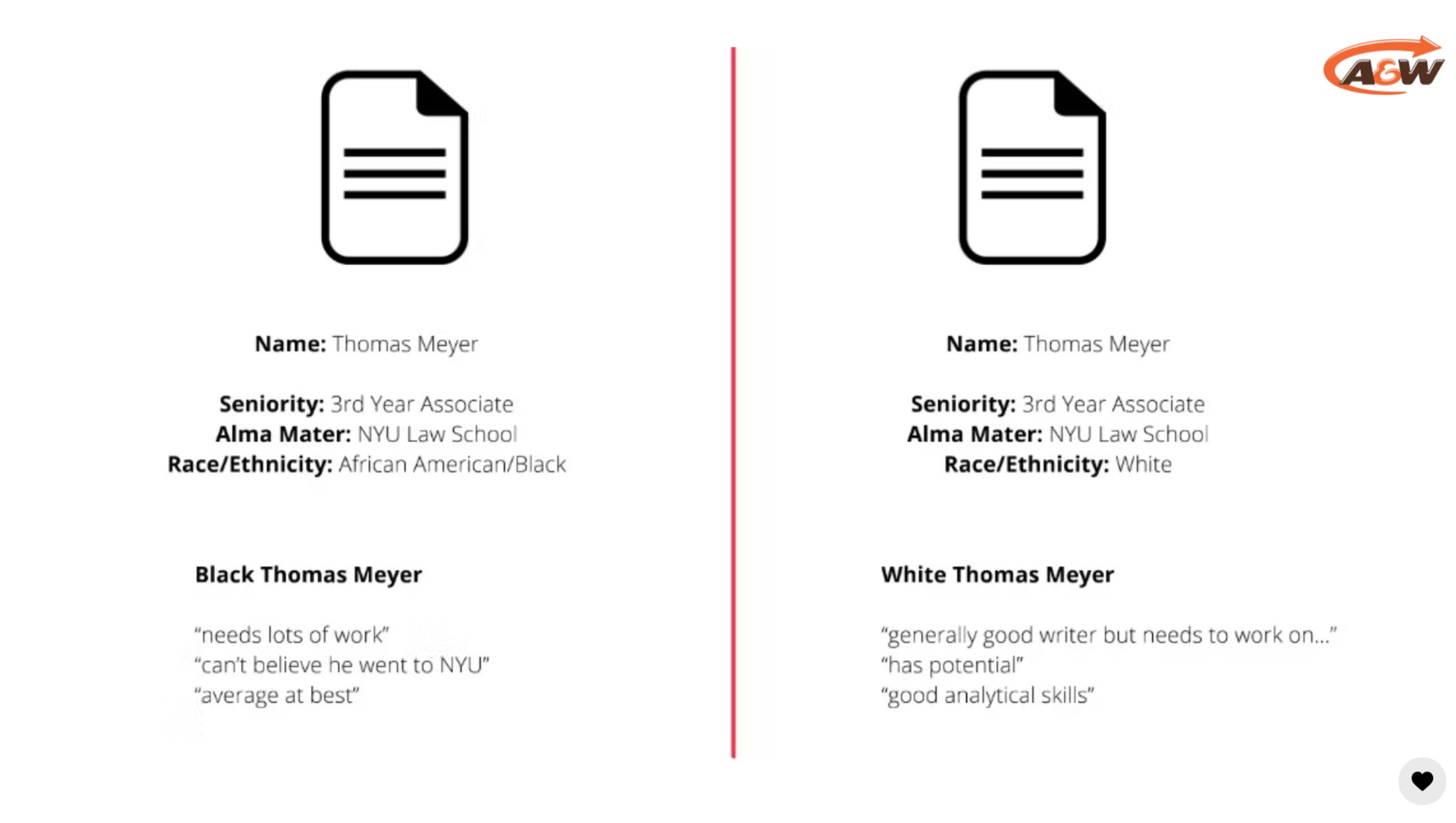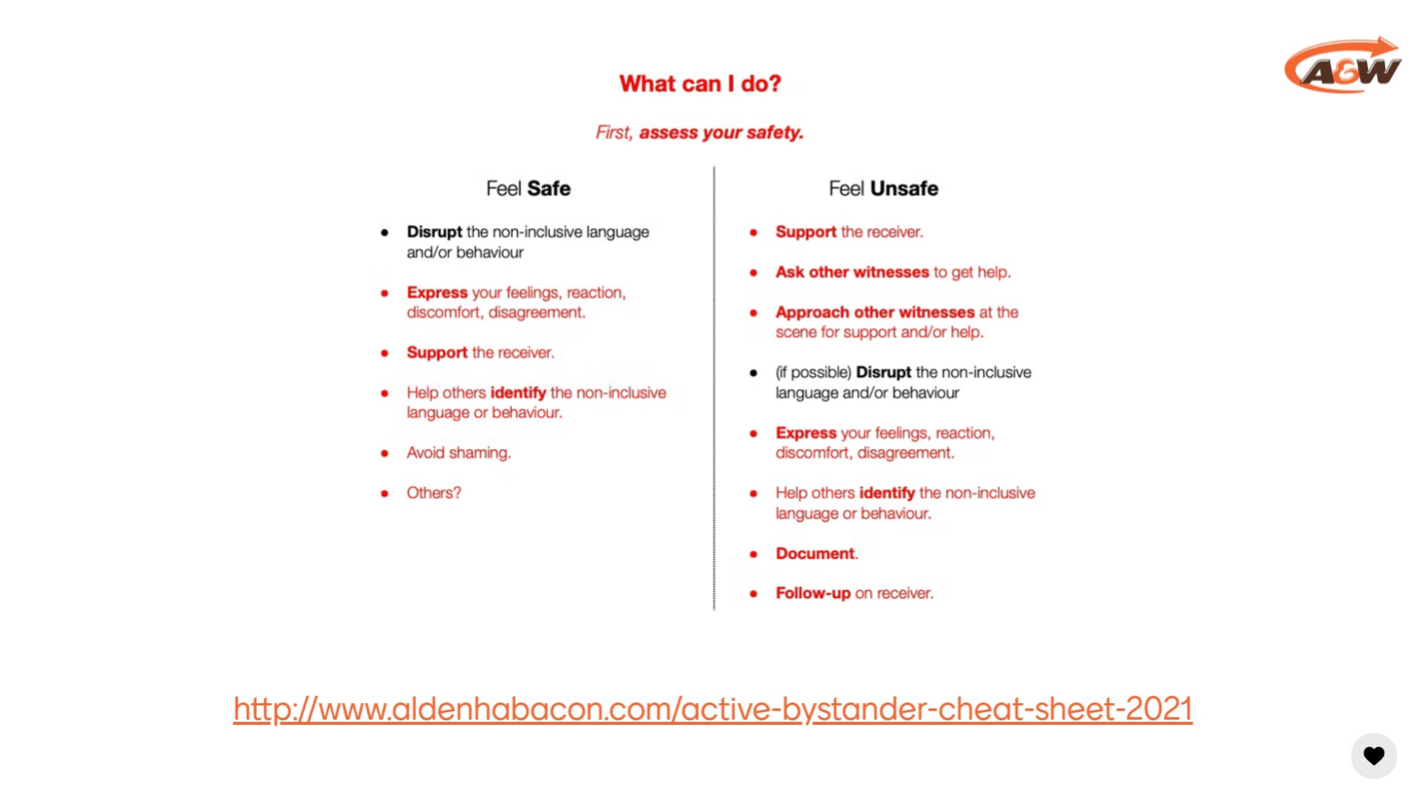
THANK YOU for making the time to participate and contribute to the baseline Equity, Diversity & Inclusion (EDI) training, as coordinated by A&W. Please find below the descriptions and the most currently-used visuals for following modules:
Unconscious Bias
How to be an Ally
Active Bystander Training
Also below are the results of the polls from each of the sessions. If you would like one of the slides as a PDF, or have a question or some feedback, please feel free to send us an email directly at info@iexcellencestrategy.com.
This page will be updated to reflect future modules.
Source: Deloitte and Victorian Equal Opportunity and Human Rights Commission (2013).
Module 1.
Unconscious Bias
Cohort 1 - Dec 10, 2021































































































Cohort 2 - March 15, 2022


















































































Cohort 3 - March 17, 2022














































































Cohort 4 - March 24, 2022



























































































At the core of inclusive leadership and intercultural capacity is self-awareness: a deep understanding of one’s implicit (or personal) bias and the systemic biases that affect all kinds of decision-making. As an extension of the emphasis on self-awareness in the MBTI training, this module was devoted to understanding key forms of implicit bias that commonly affect workplaces (affinity bias; confirmation bias; and social comparison bias) in general, and three behavioural biases that specifically disadvantage women in the workplace. This module led participants in identifying and sharing examples of unconscious bias in the workplace and other work-related environments.
With a specific focus on bringing awareness to and disrupting unconscious and cultural bias in the selection process of new hires, this session provided an understanding of how biases are formed in our unconscious, and specifically addressed the following:
Gender Biases:
Maternal bias;
Competency/Likeability trade-off bias;
Performance attribution bias.
Affinity bias;
Confirmation bias
Social comparison bias;
Attribution error;
Distance bias.
Unconscious Bias Handout Package (PDF download)
“How To Fight Racial Bias When It's Silent And Subtle.” (NPR)
Resources
Books:
The Person You Mean to Be by Dolly Chugh
ReInventing Diversity: Transforming Organization Community to Strengthen People, Purpose, and Performance by Howard J. Ross
Blind Spot: Hidden Biases of Good People by Mahzarin R. Banaji and Anthony G. Greenwald
Hope in the Dark: Untold Histories, Wild Possibilities by Rebecca Solnit
Interviews:
Are you a 'Good-ish' Person? How to Push Past your Biases (Interview with Dolly Chugh on her book The Person you Mean to Be)
Caroline Criado-Perez on Data Bias and 'Invisible Women' (Interview with author of Invisible Women: Data Bias in a World Designed for Men)
Videos:
Module 2.
How to be an Ally
Cohort 1 - May 6, 2022


















































Cohort 2 - May 10, 2022

















































Cohort 3 - May 26, 2022




















































Types of Allies (“Better Allies” by Karen Catlin)
Sponsor: Vocal support of colleagues from inequity-experiencing groups to help boost reputation and standings
Champion: Vocal PUBLIC support/deferral to colleagues from inequity-experiencing groups
Amplifier: Ensures marginalized voices are heard AND respected
Advocate: Uses their power and influence (privilege) to bring peers from marginalized groups into exclusive circles
Scholar: Seeks to learn as much as possible about the challenges/prejudices marginalized groups face. They educate themselves
Upstander: Combats any wrongdoing they see. They push back on offensive comments/jokes even when nobody is there to hear it
Confidant: Creates a safe space for marginalized groups to express fears/frustrations/needs. They validate their experiences
5 Traits of Being an Ally (“Becoming an Ally” by Anne Bishop)
Allies LISTEN
Allies CRAVE THE CREDIBILITY, not the credit
ACTIONS, not words
They’re AWAKE!
They’re self-aware to their own experience of oppression or disadvantage
Module 3.
Active Bystander Training
Cohort 1 - June 7, 2022






















































Cohort 2 - June 14, 2022














































Cohort 3 - June 14, 2022














































Active Bystander Scenarios
Consider:
What impact will this scenario have on your colleague/team/community?
What potential impact would not disrupting the behaviour have?
How do you feel in the moment? What emotions might you feel in the scenario?
Discuss:
How might you be an active bystander in that moment?
(Group 1) A colleague says, “Do we really need to be doing this EDI stuff? I haven’t seen any discrimination at A&W. We’re all so busy. Why can’t we just get on with our jobs?”
(Group 2) During a casual conversation between colleagues about weekend plans, one of your colleagues who came out as a lesbian mentions that she’ll be fixing up the house. Another colleague jokes that they didn’t know she was the “guy” in the relationship.
(Group 3 & Group 4) A colleague makes comments that upset you, and when you tell them this, they say, “That’s not even what I meant. Besides, it’s your choice to be offended.”
(Group 5 & Group 6) Given recent news, there is discussion in your work environment about movements around racial equity. You overhear a colleague say to your colleague of colour, “I don’t mean to be offensive but I don’t really understand why it’s bad to say ‘All Lives Matter’...I mean, they do, don’t they?”
For more information on why it’s problematic to say “All Lives Matter,” please read this: History of Slavery Professor Explains The Mistake In Saying ‘All Lives Matter’
(Group 7 & Group 8) During a meeting, your people manager says a racial slur during a meeting. Your colleague of colour waits until the end of the meeting before they call your manager out on it. Your people manager brushes it off and says, “That’s not what I meant. It was just a joke anyway.”
(Group 9) A new employee has just joined your team, and is meeting you and your colleagues for the first time. When they approach one of your colleagues to shake hands and introduce themselves, you overhear your colleague chuckle and say, “That’s a weird name. I’ll give call you ____ for short.”
(Group 10) You approach a supervisor for help with a problem you are having with a female co-worker. Your supervisor responds, “Don’t worry about it. She probably just gets upset when it’s her time of month.”